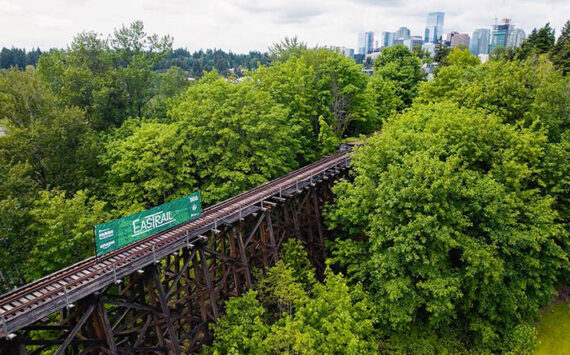Carbon Washington, the group behind the state legislature initiative to institute a supposedly revenue-neutral tax on carbon, last week submitted 350,000 signatures to the Secretary of State—either a bold or reckless decision, depending on whom you talk to. While the Carbon WA campaign has more than enough signatures to reach the legislature, insiders say it’s unlikely to pass there—meaning it will bounce onto the November state ballot, where it could face off against a second carbon initiative in a divided-we-fail scenario that has caused plenty of hand-wringing in the environmental community.
The idea behind I-732 is to discourage a bad thing (emitting carbon) by making it more expensive through taxes, but to offset those new taxes with cuts to the sales tax and business tax and support for low-income tax programs.
The fact that it’s revenue-neutral makes Carbon WA unpopular among the many well-established environmental, social-justice, and labor groups who make up the Alliance for Jobs and Clean Energy. They say climate policy must include subsidies for marginalized populations, such as migrant farmworkers, who bear the worst effects of climate change. They also say Carbon WA executive director Yoram Bauman bypassed stakeholders in those communities when he drafted its initiative, which is based on a tax already in place in Vancouver, B.C.
“He didn’t bring anyone to the table besides economists, lawyers . . . But he didn’t speak to the community,” says Sarra Tekola, an activist who also works in Councilmember Mike O’Brien’s office. Tekola was part of a small demonstration outside Carbon WA’s office last week protesting the group’s decision to file the initiative. “They went on a limb by themselves, did it by themselves, and they’re wondering now why they are standing by themselves.”
Critics also point to confidential data that shows Carbon WA’s proposal polling significantly lower than an alternative that uses carbon-tax revenue to pay for things like renewable energy subsidies and aid to affected communities. Bauman and his cohort had hoped their proposal’s revenue neutrality would attract bipartisan and business support, but so far they’ve been disappointed.
“Where the momentum for carbon and climate solutions is, [is] on the left,” says Tekola. “And Yoram thought that he could compromise the left to get the right on board. The right never got on board.”
The resulting proposal, she says, “is not acceptable. We cannot accept the Republican solution to climate change when they don’t believe in climate change.”
While tension between the two groups had been simmering for months, there had been recent signs that a detente was at hand. In a previous Seattle Weekly story [Sara Bernard, “CO² and You,” Oct. 28], both sides emphasized that the division was not as wide as had been reported. A compromise between the two groups appeared at hand when Carbon WA announced four days before Christmas that it was negotiating with the Alliance for a deal in which Carbon WA would not turn in its signatures, and the two groups would work together circulating petitions for a jointly crafted initiative to the people (which has a later deadline for signature submission). However, those negotiations ultimately went nowhere, and Carbon WA decided to forge ahead.
Undaunted though Carbon WA is, the group’s route to victory is fraught. Key legislators say the measure has about a snowball’s chance in hell of getting passed through an increasingly dysfunctional statehouse, and if it gets bounced to the ballot it will likely be heavily opposed by the fossil-fuel industry. It will also be dogged by a nonpartisan legislative report released last week that found the measure will likely cost the state $675 million over four years—far from revenue-neutral. (Bauman disputes the analysis.)
Reuven Carlyle, the Democratic chair of the House finance committee who is departing for a state Senate seat, says he’s optimistic about bipartisan support for climate policy in the long term, but that success during 2016’s two-month session is a longshot. “The sentiment of putting a price on carbon is absolutely growing, from the left and the right,” he says. “Whether or not we could muster the votes in an era of divided government, with the Republicans so fiercely protective of the current approach, I think is questionable at best.”
Joe Fitzgibbon, Democratic chair of the House environmental committee, agrees. “It’s very hard for me to see a scenario in which it passes the legislature. What I’ve told advocates from Carbon WA since early on is, if you can find me a single Republican senator who is willing to say that they support the proposal, then we should have a serious conversation . . . But if there’s not even one Republican senator that’s willing to say that they’d vote for it, then it’s hard for me to imagine the House spending a lot time on something that we know won’t go anywhere in the Senate.”
The House, of course, is held by Democrats, while Republicans control the Senate. Fitzgibbon acknowledges that some Democrats also have misgivings about Carbon WA.
Doug Ericksen, the Republican chair of the Senate Energy, Environment, and Telecommunications Committee, suggests he’ll oppose the tax shift. “My basic viewpoint is that if you want to build or manufacture in America, you can do it in Washington state currently with a lower carbon footprint than pretty much anywhere else, and so we should be encouraging people to come to Washington to create manufacturing jobs. I think that adding a 25 percent tax on energy would discourage businesses from locating in Washington to create good blue-collar, family-wage manufacturing jobs.”
But, Senator, doesn’t the cut to business and sales taxes stimulate business? Ericksen says he has concerns about “the government . . . trying to pick and choose those kinds of things.”
According to the Sightline Institute, Ericksen is the legislature’s third-largest recipient of political contributions from fossil-fuel companies. During a phone interview, Ericksen three times declined to affirm that human-caused climate change is real, replying, “The climate’s always changing.” E
cjaywork@seattleweekly.com








